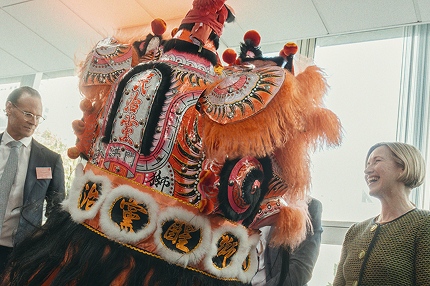Work in human resources
If you consider yourself to be approachable, an ace problem-solver and also a total people person – human resources (HR) might be the right career path for you. Your main responsibility? Supporting each one of the employees in your organisation.
Workplace health and safety. Payroll. Recruitment. Harassment. Policy and procedures. Training. Conflict resolution. Data management. You’re the go-to person for employees.
Yianni Athanasopoulos, who lectures on HR at Charles Sturt, explains what a career in this field looks like.
“HR professionals oversee the business of managing people in an organisation. This includes remuneration, benefits, training, career development, staffing, and strategic HR management. Human resources practitioners also work alongside management to recruit and retain the best employees. HR plays a central role because people are the only thing that differentiates one business from another.”
Working in management
Got a dream to make it to the top of the business world? Specialising in management and leadership is where you want to be focusing your energy. Managers and leaders can be found across all industries and fields – and your main responsibility is to provide structure and strategy to a workplace.
We’ll be real with you. Management and leadership roles can be demanding. You’ll face more pressure and have more responsibility than others. In saying that: where there’s no guts, there’s no glory! The trade-off for your hard work is, firstly, a higher salary and, secondly, loads of opportunities for career progression.
Work in marketing
Marketing is where you get to combine your business acumen with creative flair. So there are plenty of different roles for you to explore depending on your interests. Events. Advertising. Graphic design. Social media. Market research. Content marketing. Digital strategy. Likewise, sales, public relations or brand management. The opportunities are endless.
Firstly, no matter the role you find yourself in, marketing is a profoundly human field. You’ll learn how to build brand loyalty with your customers and place the customer at the centre of everything you do. It’s one of the few industries where you can bring a business idea to life through original emotive content deployed via marketing campaigns and projects.
Felicity Small is a senior lecturer in marketing at Charles Sturt and knows that a career in marketing is very rewarding.
“The diverse range of activities involved in marketing can lead to a personalised and also engaging career. Marketers monitor, track and also predict societal shifts. They tell stories to engage with others. Then explore and analyse individuals’ behaviour and big data sets to draw insights. They also create disruptive innovations to provide solutions for consumer problems. Consequently, a business degree in marketing contains a set of skills that will take you anywhere you want to go.”
Work in strategy
More and more businesses are looking for people with the ability to look at an organisation through a strategic lens. As a result, it’s not simply enough to understand how a business runs, you need the vision, data and also planning skills to take things to the next level.
When you work in strategic planning, you’ll set overall goals for your organisation and develop a plan to achieve them. So you’ll need to have complete oversight of the entire business, an understanding of the strategic goals and priorities, and the vision to bring those plans to life.
Dr Alain Neher is an Associate Professor in the School of Business at Charles Sturt University. He’s up to date with the ins and out of strategic planning and also why there has been such an increase in demand for planning professionals






